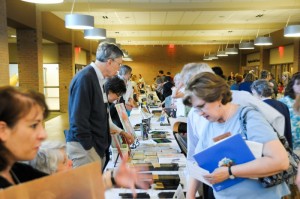 By the time this post runs, I’ll be in Grand Rapids at the Calvin Festival of Faith and Writing. Since I am now a mid-careerish, spiritually mature woman attending the event for the fourth time, I will certainly not embarrass myself by committing the following rookie atrocities*:
By the time this post runs, I’ll be in Grand Rapids at the Calvin Festival of Faith and Writing. Since I am now a mid-careerish, spiritually mature woman attending the event for the fourth time, I will certainly not embarrass myself by committing the following rookie atrocities*:
Forgetting Michigan is on Eastern Standard Time and becoming self-righteously flustered when I find out I’m late for the opening session because who does Michigan think she is, New York?
Introducing myself with “Vander” in front of my decidedly unDutch surname to get a laugh from all those Reformed folk.
Standing in line to talk to Greg Wolfe while trying to look like I’m not really standing in line, and when I get my turn, renewing my subscription to Image because I don’t know what else to say. Realizing that because of similar conference encounters, my issues should safely arrive through 2025.
Walking up to an editor busily unpacking boxes at her publisher’s table and thrusting a manuscript in her face because editors are hard up for manuscripts, desperately seek ways to fill their down time, and thrive on surprises.
Don’t get me wrong: the festival is not just about making an ass of yourself. I’ve met some of my best friends there in an almost eerie love-at-first-sight fashion. I’ve experienced the joy of walking into an auditorium to hear heroes I’ve already read widely, like Mary Karr and Parker Palmer, and wandering into sessions to discover fabulous new-to-me poets, like Robert Siegel and Barbara Crooker.
Most importantly, I’ve eaten lots of complimentary M&M’s at coffee breaks, and they seem to be injected with extra chocolate endorphins. Like the Olympiad, the period “between Calvins” is a time of remembrance and anticipation.
Yet underneath the festival, and, really, any event where two or more writers are gathered, simmers an undertone of anxiety. Anxiety about acceptance, security, jealousy, and competition. The angst doesn’t just come from the feelings themselves, but from knowing you have them in the first place, feeling guilty about them, and wondering if you will ever completely outgrow them.
Or maybe it’s just me.
While completing my MFA, all I wanted was to get a published. Finally, the summer after I graduated, I received an acceptance letter for a poem I had written about wildfires. For the six months or so until the issue came out, I felt secure and accomplished: I was going to be a published poet.
Then the issue arrived.
The typo was of the worst kind. My poem included the phrase “nervous half-sleep,” but the editors had printed “nervous half-sheep” instead. Need I describe the image? No, you already envisioned the jittery, dismembered beast for yourself.
So after that fiasco, I sought a “real” publication, one that didn’t make a mistake. (Half of them did.) Then I worked toward publication in journals with certain circulation numbers or recognizable names. I eventually hit those milestones but still didn’t feel validated as a poet.
A chapbook—with a real ISBN number!—is what I needed. Then I’d earn the label of “author.”
But not for long, because soon after the chapbook came out, people asked if I was working on an actual book next. And then I was plopping down $15-20 a pop for contests.
True, each accomplishment paves the way for the next. But those accomplishments buckle with botched contracts, textless spines, and Amazon rankings at #657,329,187. And for every book you publish, a thousand more look better, sell better, and win more awards. And even if you win most of the major awards available in this country, the majority of the population will never recognize your name.
But let’s say you remove the whole publication equation. You may feel truly satisfied with your numerous titles or not really care one way or another whether your work is in print. Can anything else trigger anxiety at a gathering of writers?
Yes. Oh, yes.
Do you have someone to eat lunch with? If not, why not? Why aren’t you better connected? What is wrong with you that you even care about connections? Don’t you care about people? Gosh, you’re a narcissist.
Should you regale the scholar with funny stories about your children to avoid talking about literary theory? Do you let on that you still haven’t read Moby Dick? Why do you always have basil in your teeth? What about the poet over there who is younger, prettier, and decked out with hipper earrings and scarves?
The eyes are never satisfied, Solomon says. He should know. He had a thousand wives and concubines. With each new woman, he probably believed, even in the smallest of ways, that this one—the one with the higher cheekbones, the softer wrists, or the thicker hair—would make all the difference.
A pastor once made a profound statement that has stayed with me longer than anything I’ve heard from the pulpit in fifteen years (although I obviously haven’t always heeded it): In the game of keeping up with the Joneses, let them win.
So this year, with God’s help, I am letting them win, all the writing Joneses out there. With his help, I am considering others better than myself. I am delighting in their laughter and quirks, their stories and poems, and their earrings and scarves, and worrying less about what they think of me. For when it comes right down to it, the “real” writing life is nothing more than scratching a pencil or clicking a keyboard in the still, silent room of God.
And that is more than enough.
*To read about more Festival atrocities, see TaniaVanderRunyan.com. For queries about her Image subscription subletting program, leave a comment below.
Tania Runyan is the author of the poetry collections Second Sky (Cascade Poiema Series), A Thousand Vessels, Simple Weight, and Delicious Air, which was awarded Book of the Year by the Conference on Christianity and Literature in 2007. Her book How to Read a Poem, an instructional guide based on Billy Collins’s “Introduction to Poetry,” was recently released by T.S. Poetry Press. Her poems have appeared in many publications, including Poetry, Image, Books & Culture, Harvard Divinity Bulletin, The Christian Century, Atlanta Review, Indiana Review, and the anthology In a Fine Frenzy: Poets Respond to Shakespeare. Tania was awarded an NEA Literature Fellowship in 2011. She tutors high school students and edits for Every Day Poems and Relief.











